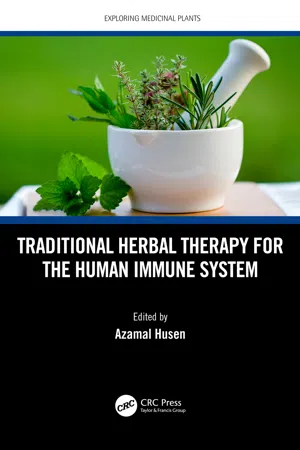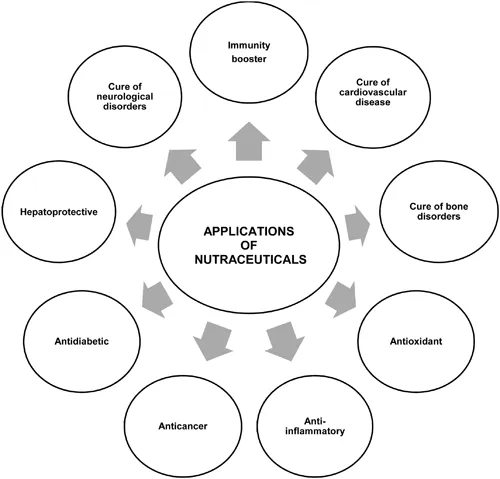
Traditional Herbal Therapy for the Human Immune System
Azamal Husen, Azamal Husen
- 488 pages
- English
- ePUB (mobile friendly)
- Available on iOS & Android
Traditional Herbal Therapy for the Human Immune System
Azamal Husen, Azamal Husen
About This Book
Drawing on indigenous and scientific knowledge of medicinal plants, Traditional Herbal Therapy for the Human Immune System presents the protective and therapeutic potential of plant-based drinks, supplements, nutraceuticals, synergy food, superfoods, and other products. Medicinal plants and their products can affect the immune system and act as immunomodulators.
Medicinal plants are popularly used in folk medicine to accelerate the human immune defence and improve body reactions against infectious or exogenous injuries, as well as to suppress the abnormal immune response occurring in immune disorders. This book explains how medicinal plants can act as a source of vitamins and improve body functions such as enhanced oxygen circulation, maintained blood pressure and improved mood. It also outlines how specific properties of certain plants can help boost the immune system of humans with cancer, HIV, and COVID-19.
Key features:
- Provides specific information on how to accelerate and or fortify the human immune system by using medicinal plants.
- Presents scientific understanding of herbs, shrubs, climbers and trees and their potential uses in conventional and herbal medicine systems.
- Discusses the specific role of herbal plants that act as antiviral and antibacterial agents and offer boosted immunity for cancer, H1N1 virus, relieving swine flu, HIV and COVID-19 patients.
Part of the Exploring Medicinal Plants series, this book is useful for researchers and students, as well as policy makers and people working in industry, who have an interest in plant-derived medications.
Frequently asked questions
Information
1 Plant-based Potential Nutraceuticals for Improving the Human Immune System
1.1 Introduction

Table of contents
- Cover
- Half-Title
- Series
- Title
- Copyright
- Dedication
- Contents
- Preface
- About the Editor
- Contributors
- Disclaimer
- Chapter 1 Plant-based Potential Nutraceuticals for Improving the Human Immune System
- Chapter 2 Antibacterial Properties of Medicinal Plants: Recent Trends, Progress, and Challenges
- Chapter 3 Antiviral Activity of Medicinal Plants: Current Understanding, Prospects, and Challenges
- Chapter 4 Conventional Medicinal Plants: Boosting the Immune System in Humans
- Chapter 5 Medicinal Plants for Strong Immune System and Traditional Skin Therapy in South Africa: An Overview
- Chapter 6 Traditional African Medicinal Plants for a Strong Immune System
- Chapter 7 Traditional Brazilian Medicinal Plants for a Strong Immune System
- Chapter 8 Traditional Himalayan Plants: Nature’s Gift for Maintaining a Strong Immune System
- Chapter 9 Traditional South Indian Herbal Plants for a Strong Immune System
- Chapter 10 Sacred Medicinal Plants and their Use by Indigenous People for Strengthening the Immune System
- Chapter 11 Molecular Features of Potential Herbal Products in Enhancing Human Immune System
- Chapter 12 Specific Plant Nutrients and Vitamins that Fortify Human Immune System
- Chapter 13 Role of Specific Spices in Fortifying the Human Immune System
- Chapter 14 Specific Fruits and Berries for a Strong Human Immune System
- Chapter 15 Natural Immunity Boosters and Anticancer Medicinal Plants
- Chapter 16 Potential of Medicinal Plants as Immunity Booster against COVID-19
- Index